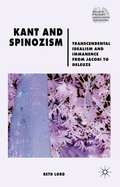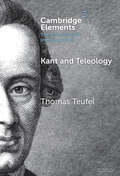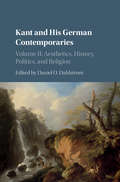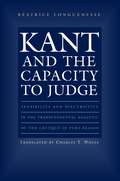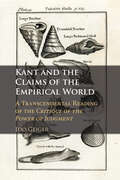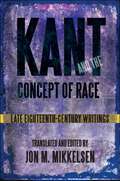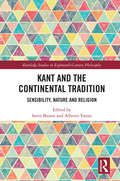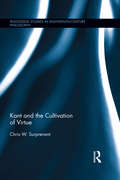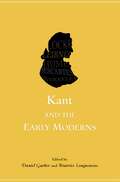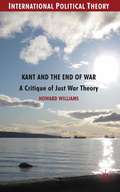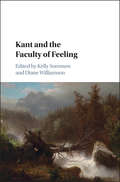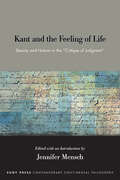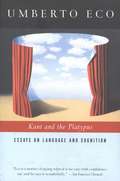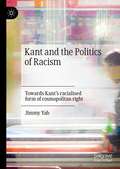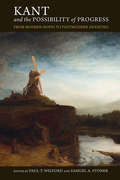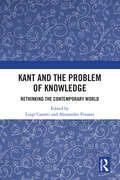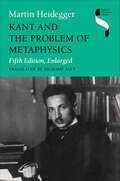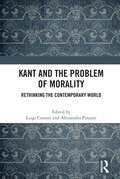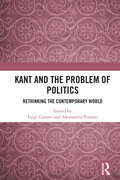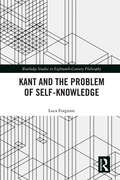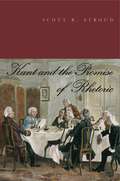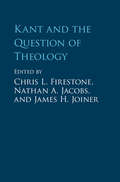- Table View
- List View
Kant and Spinozism
by Beth LordBeth Lord looks at Kant's philosophy in relation to four thinkers who attempted to fuse transcendental idealism with Spinoza's doctrine of immanence. Examining Jacobi, Herder, Maimon and Deleuze, Lord argues that Spinozism is central to the development of Kant's thought, and opens new avenues for understanding Kant's relation to Deleuze.
Kant and Teleology (Elements in the Philosophy of Immanuel Kant)
by Thomas TeufelKant's mature teleological philosophy in the Critique of the Power of Judgment is predicated on innovations that address a set of unprecedented challenges arising from within critical philosophy. The challenges are (1) a threat of “transcendental chaos” between sensibility and understanding, emerging from the structure of critical epistemology; (2) a threat of “critical chaos” between determination and reflection, generated by Kant's response to that first threat. The innovations include (a) a transcendental conception of purposiveness, (b) a principle of nature's purposiveness based on that conception, (c) a power of judgment governed by that principle, (d) and so governed in an unusual (self-given and self-governing) way, (e) a view on which nature does make leaps. This Element argues that Kant's mature teleological philosophy – and a fortiori Kant's aesthetics and philosophy of biology – cannot be understood without a fully systematic account of these challenges and innovations, and it presents such an account.
Kant and his German Contemporaries: Volume 2, Aesthetics, History, Politics, and Religion
by Daniel O. DahlstromKant's philosophical achievements have long overshadowed those of his German contemporaries, often to the point of concealing his contemporaries' influence upon him. This volume of new essays draws on recent research into the rich complexity of eighteenth-century German thought, examining key figures in the development of aesthetics and art history, the philosophy of history and education, political philosophy, and the philosophy of religion. The essays range over numerous thinkers including Baumgarten, Mendelssohn, Meyer, Winckelmann, Herder, Schiller, Hamann and Fichte, showing how they variously influenced, challenged, and revised Kant's philosophy, at times moving it in novel directions unacceptable to the magister himself. The volume will be valuable for all who are interested in this distinctive period of German philosophy.
Kant and the Capacity to Judge: Sensibility and Discursivity in the Transcendental Analytic of the Critique of Pure Reason
by Béatrice LonguenesseKant claims to have established his table of categories or "pure concepts of the understanding" according to the "guiding thread" provided by logical forms of judgment. By drawing extensively on Kant's logical writings, Béatrice Longuenesse analyzes this controversial claim, and then follows the thread through its continuation in the transcendental deduction of the categories, the transcendental schemata, and the principles of pure understanding. The result is a systematic, persuasive new interpretation of the Critique of Pure Reason. Longuenesse shows that although Kant adopts his inventory of the forms of judgment from logic textbooks of his time, he is nevertheless original in selecting just those forms he holds to be indispensable to our ability to relate representations to objects. Kant gives formal representation to this relation between conceptual thought and its objects by introducing the term "x" into his analysis of logical forms to stand for the object that is "thought under" the concepts that are combined in judgment. This "x" plays no role in Kant's forms of logical inference, but instead plays a role in clarifying the relation between logical forms (forms of concept subordination) and combinations ("syntheses") of perceptual data, necessary for empirical cognition. Considering Kant's logical forms of judgment thus helps illuminate crucial aspects of the Transcendental Analytic as a whole, while revealing the systematic unity between Kant's theory of judgment in the first Critique and his analysis of "merely reflective" (aesthetic and teleological) judgments in the third Critique.
Kant and the Claims of the Empirical World: A Transcendental Reading of the Critique of the Power of Judgment
by Ido GeigerKant announces that the Critique of the Power of Judgment will bring his entire critical enterprise to an end. But it is by no means agreed upon that it in fact does so and, if it does, how. In this book, Ido Geiger argues that a principal concern of the third Critique is completing the account of the transcendental conditions of empirical experience and knowledge. This includes both Kant's analysis of natural beauty and his discussion of teleological judgments of organisms and of nature generally. Geiger's original reading of the third Critique shows that it forms a unified whole - and that it does in fact deliver the final part of Kant's transcendental undertaking. His book will be valuable to all who are interested in Kant's theory of the aesthetic and conceptual purposiveness of nature.
Kant and the Concept of Race: Late Eighteenth-Century Writings (SUNY series, Philosophy and Race)
by Jon M. MikkelsenKant and the Concept of Race features translations of four texts by Immanuel Kant frequently designated his Racenschriften (race essays), in which he develops and defends an early theory of race. Also included are translations of essays by four of Kant's contemporaries—E. A. W. Zimmermann, Georg Forster, Christoph Meiners, and Christoph Girtanner—which illustrate that Kant's interest in the subject of race was part of a larger discussion about human "differences," one that impacted the development of scientific fields ranging from natural history to physical anthropology to biology.
Kant and the Continental Tradition: Sensibility, Nature, and Religion (Routledge Studies in Eighteenth-Century Philosophy)
by Sorin Baiasu Alberto VanzoImmanuel Kant’s work continues to be a main focus of attention in almost all areas of philosophy. The significance of Kant’s work for the so-called continental philosophy cannot be exaggerated, although work in this area is relatively scant. The book includes eight chapters, a substantial introduction and a postscript, all newly written by an international cast of well-known authors. Each chapter focuses on particular aspects of a fundamental problem in Kant’s and post-Kantian philosophy, the problem of the relation between the world and transcendence. Chapters fall thematically into three parts: sensibility, nature and religion. Each part starts with a more interpretative chapter focusing on Kant’s relevant work, and continues with comparative chapters which stage dialogues between Kant and post-Kantian philosophers, including Martin Heidegger, Hannah Arendt, Jean-François Lyotard, Luce Irigaray and Jacques Derrida. A special feature of this volume is the engagement of each chapter with the work of the late British philosopher Gary Banham. The Postscript offers a subtle and erudite analysis of his intellectual trajectory, philosophy and mode of working. The volume is dedicated to his memory.
Kant and the Cultivation of Virtue: Kant And The Cultivation Of Virtue (Routledge Studies in Eighteenth-Century Philosophy)
by Chris W. SurprenantIn this book, Chris W. Surprenant puts forward an original position concerning Kant’s practical philosophy and the intersection between his moral and political philosophy. Although Kant provides a detailed account of the nature of morality, the nature of human virtue, and how right manifests itself in civil society, he does not explain fully how individuals are able to become virtuous. This book aims to resolve this problem by showing how an individual is able to cultivate virtue, the aim of Kant’s practical philosophy. Through an examination of Kant’s accounts of autonomy, the state, and religion, and their effects on the cultivation of virtue, Surprenant develops a Kantian framework for moral education, and ultimately raises the question of whether or not Kantian virtue is possible in practice.
Kant and the Early Moderns
by Daniel Garber and Béatrice LonguenesseFor the past 200 years, Kant has acted as a lens--sometimes a distorting lens--between historians of philosophy and early modern intellectual history. Kant's writings about Descartes, Leibniz, Locke, Berkeley, and Hume have been so influential that it has often been difficult to see these predecessors on any terms but Kant's own. In Kant and the Early Moderns, Daniel Garber and Béatrice Longuenesse bring together some of the world's leading historians of philosophy to consider Kant in relation to these earlier thinkers. These original essays are grouped in pairs. A first essay discusses Kant's direct engagement with the philosophical thought of Descartes, Leibniz, Locke, Berkeley, or Hume, while a second essay focuses more on the original ideas of these earlier philosophers, with reflections on Kant's reading from the point of view of a more direct interest in the earlier thinker in question. What emerges is a rich and complex picture of the debates that shaped the "transcendental turn" from early modern epistemology, metaphysics, and philosophy of mind to Kant's critical philosophy. The contributors, in addition to the editors, are Jean-Marie Beyssade, Lisa Downing, Dina Emundts, Don Garrett, Paul Guyer, Anja Jauernig, Wayne Waxman, and Kenneth P. Winkler.
Kant and the End of War
by Howard WilliamsKant stands almost unchallenged as one of the major thinkers of the European Enlightenment. This book brings the ideas of his critical philosophy to bear on one of the leading political and legal questions of our age: under what circumstances, if any, is recourse to war legally and morally justifiable? This issue was strikingly brought to the fore by the 2003 war in Iraq. The book critiques the tradition of just war thinking and suggests how international law and international relations can be viewed from an alternative perspective that aims at a more pacific system of states. Instead of seeing the theory of just war as providing a stabilizing context within which international politics can be carried out, Williams argues that the theory contributes to the current unstable international condition. The just war tradition is not the silver lining in a generally dark horizon but rather an integral feature of the dark horizon of current world politics. Kant was one of the first and most profound thinkers to moot this understanding of just war reasoning and his work remains a crucial starting point for a critical theory of war today.
Kant and the Faculty of Feeling
by Diane Williamson Kelly SorensenKant stated that there are three mental faculties: cognition, feeling, and desire. The faculty of feeling has received the least scholarly attention, despite its importance in Kant's broader thought, and this volume of new essays is the first to present multiple perspectives on a number of important questions about it. Why does Kant come to believe that feeling must be described as a separate faculty? What is the relationship between feeling and cognition, on the one hand, and desire, on the other? What is the nature of feeling? What do the most discussed Kantian feelings, such as respect and sublimity, tell us about the nature of feeling for Kant? And what about other important feelings that have been overlooked or mischaracterized by commentators, such as enthusiasm and hope? This collaborative and authoritative volume will appeal to Kant scholars, historians of philosophy, and those working on topics in ethics, aesthetics, and emotions.
Kant and the Feeling of Life: Beauty and Nature in the Critique of Judgment (SUNY series in Contemporary Continental Philosophy)
by Jennifer MenschKant and the Feeling of Life positions Kant's concept of life as a guiding thread for understanding not only Kant's approach to aesthetics and teleology but the underlying unity of the Critique of Judgment itself. The "feeling of life," which Kant describes as affecting us in various ways—as animating, enlivening, and quickening the mind—lies at the heart of Kant's philosophical project, but it has remained understudied for a theme of such centrality. This volume brings together, for the first time, essays focused on the topic of life in Kant's work, providing a wealth of perspectives and analyses ranging from the Critique of Judgment to Kant's early aesthetics, his social and political philosophy, his work connected to the body and health, and his moral theory.
Kant and the French Revolution (Elements in the Philosophy of Immanuel Kant)
by Reidar MaliksTo Kant, the French revolution's central events were the transfer of sovereignty to the people in 1789 and the trial and execution of the monarch in 1792-1793. Through a contextual study, this Element argues that while both events manifested the principle of popular sovereignty, the first did so in lawful ways, whereas the latter was a perversion of the principle. Kant was convinced that historical examples can help us understand political philosophy, and this Element seeks to show this in practice.
Kant and the Laws of Nature
by Michela Massimi Angela BreitenbachLaws of nature play a central role in Kant's theoretical philosophy and are crucial to understanding his philosophy of science in particular. In this volume of new essays, the first systematic investigation of its kind, a distinguished team of scholars explores Kant's views on the laws of nature in the physical and life sciences. Their essays focus particularly on the laws of physics and biology, and consider topics including the separation in Kant's treatment of the physical and life sciences, the relation between universal and empirical laws of nature, and the role of reason and the understanding in imposing order and lawful unity upon nature. The volume will be of great interest to advanced students and scholars of Kant's philosophy of science, and to historians and philosophers of science more generally.
Kant and the Platypus: Essays on Language and Cognition
by Umberto EcoHow do we know a cat is a cat . . . and why do we call it a cat? An &“intriguing and often fascinating&” look at words, perceptions, and the relationship between them (Newark Star-Ledger). In Kant and the Platypus, the renowned semiotician, philosopher, and bestselling author of The Name of the Rose and Foucault&’s Pendulum explores the question of how much of our perception of things is based on cognitive ability, and how much on linguistic resources. In six remarkable essays, Umberto Eco explores in depth questions of reality, perception, and experience. Basing his ideas on common sense, Eco shares a vast wealth of literary and historical knowledge, touching on issues that affect us every day. At once philosophical and amusing, Kant and the Platypus is a tour of the world of our senses, told by a master of knowing what is real and what is not. &“An erudite, detailed inquirity into the philosophy of mind . . . Here, Eco is continental philosopher, semiotician, and cognitive scientist rolled all into one.&” —Library Journal (starred review)
Kant and the Politics of Racism: Towards Kant’s racialised form of cosmopolitan right
by Jimmy YabThis book proposes an account of the place of the theory of race in Kant’s thought as a central part of philosophical anthropology in his political system. Kant’s theory of race, this book argues, is integral to the analysis of the “Charakteristik” of the human species and determined by human natural predispositions. The understanding of his theory as such suggests not only an alternative reading to the orthodox narrative we have seen so far but also reveals the underlying centrality of the notion of human natural predispositions in a way that is consequential for Kant’s philosophy as a whole. What is the impact of Kant’s racial theory on his philosophy and political thought? Is Kant a consistent egalitarian or a partisan Universalist thinker? Is he the symbol of racist prejudices of his time? What is the influence of his racial hierarchy on his cosmopolitan right? Or more simply, is Kant racist? From a systematic examination of Kant relevant writings, this book provides answers to these questions and shed light on two fundamental problems of his theory of race for moral philosophy, namely: (1) the completeness of the character of the White race and (2) the dispossession of the character of the beauty and the dignity of human nature of the Negro race. These two issues, unperceived from the “orthodox” reading’s perspective, however, uncovered by the “heterodox” reading, not only shape Kant’s race thinking from the beginning to the end of his life, transform his cosmopolitan right into a non-universalist form of right, but merely define Kant as a fundamental racist thinker since he developed the anthropology, the philosophy, and the politics of racism in a systematic way.
Kant and the Possibility of Progress: From Modern Hopes to Postmodern Anxieties
by Paul T. Wilford and Samuel A. StonerImmanuel Kant (1724-1804) transformed the philosophical, cultural, and religious landscape of modern Europe. Emphasizing the priority of practical reason and moral autonomy, Kant's radically original account of human subjectivity announced new ethical imperatives and engendered new political hopes. This collection of essays investigates the centrality of progress to Kant's philosophical project and the contested legacy of Kant's faith in reason's capacity to advance not only our scientific comprehension and technological prowess, but also our moral, political, and religious lives. Accordingly, the first half of the volume explores the many facets of Kant's thinking about progress, while the remaining essays each focus on one or two thinkers who play a crucial role in post-Kantian German philosophy: J. G. Herder (1744-1803), J. G. Fichte (1762-1814), G. W. F. Hegel (1770-1831), Søren Kierkegaard (1813-1855), Friedrich Nietzsche (1844-1900), Walter Benjamin (1892-1940), and Martin Heidegger (1889-1976). This two-part structure reflects the central thesis of the volume that Kant inaugurates a distinctive theoretical tradition in which human historicity is central to political philosophy.By exploring the origins and metamorphoses of this tremendously influential tradition, the volume offers a timely perspective on fundamental questions in an age increasingly suspicious of the Enlightenment's promise of universal rational progress. It aims to help us face three sets of questions: (1) Do we still believe in the possibility of progress? If we do, on what grounds? If we do not, why have we lost the hope for a better future that animated previous generations? (2) Is the belief in progress necessary for the maintenance of today's liberal democratic order? Does a cosmopolitan vision of politics ultimately depend on a faith in humanity's gradual, asymptotic realization of that lofty aim? (3) And, if we no longer believe in progress, can we dispense with hope without succumbing to despair?
Kant and the Problem of Knowledge: Rethinking the Contemporary World
by Alessandro Pinzani Luigi CarantiThis book examines Kant’s contributions to the theory of knowledge and studies how his writings can be applied to address contemporary epistemological issues. The volume delves into the Kantian ideas of transcendental idealism, space, naturalism, epistemic normativity, communication, and systematic unity. The essays in the volume study Kant’s theories from a fresh perspective and offer new arguments for assenting that knowledge cannot account for itself without acknowledging the fundamental role of the cognitive subject. In doing so, they suggest that we reconsider Kant’s views as a powerful alternative to naturalism. Featuring readings by well-known Kant specialists and emerging scholars with unorthodox approaches to Kant’s philosophy, the volume fills a significant gap in the existing scholarship on the philosopher and his works. It will be of great interest to scholars and researchers of knowledge, philosophy, and epistemology.
Kant and the Problem of Metaphysics (Studies in Continental Thought)
by Martin HeideggerSince its original publication in 1929, Martin Heidegger's provocative book on Kant's Critique of Pure Reason has attracted much attention both as an important contribution to twentieth-century Kant scholarship and as a pivotal work in Heidegger's own development after Being and Time. This fifth, enlarged edition includes marginal notations made by Heidegger in his personal copy of the book and four new appendices—Heidegger's postpublication notes on the book, his review of Ernst Cassirer's Philosophy of Symbolic Forms, Heidegger's response to reviews by rudolf Odebrecht and Cassirer, and an essay "On the History of the Philosophical Chair since 1866." The work is significant not only for its illuminating assessment of Kant's thought but also for its elaboration of themes first broached in Being and Time, especially the problem of how Heidegger proposed to enact his destruction of the metaphysical tradition and the role that his reading of Kant would play therein.
Kant and the Problem of Morality: Rethinking the Contemporary World
by Alessandro Pinzani Luigi CarantiThis book examines the significance of Kant’s moral philosophy in contemporary philosophical debates. It argues that Kant’s philosophy can still serve as a guide to navigate the turbulence of a globalized world in which we are faced by an imprescriptible social reality wherein moral values and ethical life models are becoming increasingly unstable. The volume draws on Kantian ethics to discuss various contemporary issues, including sustainable development, moral enhancement, sexism, and racism. It also tackles general concepts of practical philosophy such as lying, the different kinds of moral duties, and the kind of motivation one needs for doing what we consider the right thing. Featuring readings by well-known Kant specialists and emerging scholars with unorthodox approaches to Kant’s philosophy, the volume will be of great interest to scholars and researchers of philosophy, politics and ethics. It will also appeal to moral theorists, applied ethicists and environmental theorists.
Kant and the Problem of Politics: Rethinking the Contemporary World
by Alessandro Pinzani Luigi CarantiThis book examines the significance of Kant’s political philosophy in the context of contemporary philosophical and political debates. In the last few decades, Kantian specialists have increasingly manifested a purely exegetic and philological interest in Kant’s oeuvre, while contemporary philosophers and scientists tend to use Kant with scant hermeneutical care, thus misrepresenting or misunderstanding his positions. This volume countervails these tendencies by focusing more on specific themes of contemporary relevance in Kant’s writings. It looks to Kant’s political thought for insight on tackling issues such as freedom of speech, democracy and populism, intergenerational justice, economic inequality, money, poverty, international justice, and gender/feminism. Featuring readings by well-known Kant specialists and emerging scholars with unorthodox approaches to Kant’s philosophy, the volume fills a significant gap in the existing scholarship on the philosopher and his works. It will be of great interest to scholars and researchers of philosophy, politics, and ethics.
Kant and the Problem of Self-Knowledge (Routledge Studies in Eighteenth-Century Philosophy)
by Luca ForgioneThis book addresses the problem of self-knowledge in Kant’s philosophy. As Kant writes in his major works of the critical period, it is due to the simple and empty representation ‘I think’ that the subject’s capacity for self-consciousness enables the subject to represent its own mental dimension. This book articulates Kant’s theory of self-knowledge on the basis of the following three philosophical problems: 1) a semantic problem regarding the type of reference of the representation ‘I’; 2) an epistemic problem regarding the type of knowledge relative to the thinking subject produced by the representation ‘I think’; and 3) a strictly metaphysical problem regarding the features assigned to the thinking subject’s nature. The author connects the relevant scholarly literature on Kant with contemporary debates on the huge philosophical field of self-knowledge. He develops a formal reading according to which the unity of self-consciousness does not presuppose the identity of a real subject, but a formal identity based on the representation ‘I think’.
Kant and the Promise of Rhetoric
by Scott R. StroudImmanuel Kant is rarely connected to rhetoric by those who study philosophy or the rhetorical tradition. If anything, Kant is said to see rhetoric as mere manipulation and as not worthy of attention. In Kant and the Promise of Rhetoric, Scott Stroud presents a first-of-its-kind reappraisal of Kant and the role he gives rhetorical practices in his philosophy. By examining the range of terms that Kant employs to discuss various forms of communication, Stroud argues that the general thesis that Kant disparaged rhetoric is untenable. Instead, he offers a more nuanced view of Kant on rhetoric and its relation to moral cultivation. For Kant, certain rhetorical practices in education, religious settings, and public argument become vital tools to move humans toward moral improvement without infringing on their individual autonomy. Through the use of rhetorical means such as examples, religious narratives, symbols, group prayer, and fallibilistic public argument, individuals can persuade other agents to move toward more cultivated states of inner and outer autonomy. For the Kant recovered in this book, rhetoric becomes another part of human activity that can be animated by the value of humanity, and it can serve as a powerful tool to convince agents to embark on the arduous task of moral self-cultivation.
Kant and the Promise of Rhetoric
by Scott R. StroudImmanuel Kant is rarely connected to rhetoric by those who study philosophy or the rhetorical tradition. If anything, Kant is said to see rhetoric as mere manipulation and as not worthy of attention. In Kant and the Promise of Rhetoric, Scott Stroud presents a first-of-its-kind reappraisal of Kant and the role he gives rhetorical practices in his philosophy. By examining the range of terms that Kant employs to discuss various forms of communication, Stroud argues that the general thesis that Kant disparaged rhetoric is untenable. Instead, he offers a more nuanced view of Kant on rhetoric and its relation to moral cultivation. For Kant, certain rhetorical practices in education, religious settings, and public argument become vital tools to move humans toward moral improvement without infringing on their individual autonomy. Through the use of rhetorical means such as examples, religious narratives, symbols, group prayer, and fallibilistic public argument, individuals can persuade other agents to move toward more cultivated states of inner and outer autonomy. For the Kant recovered in this book, rhetoric becomes another part of human activity that can be animated by the value of humanity, and it can serve as a powerful tool to convince agents to embark on the arduous task of moral self-cultivation.
Kant and the Question of Theology
by James H. Jacobs Joiner Nathan A. Firestone Chris L.God is a problematic idea in Kant's terms, but many scholars continue to be interested in Kantian theories of religion and the issues that they raise. In these new essays, scholars both within and outside Kant studies analyse Kant's writings and his claims about natural, philosophical, and revealed theology. Topics debated include arguments for the existence of God, natural theology, redemption, divine action, miracles, revelation, and life after death. The volume includes careful examination of key Kantian texts alongside discussion of their themes from both constructive and analytic perspectives. These contributions broaden the scope of the scholarship on Kant, exploring the value of doing theology in consonance or conversation with Kant. It builds bridges across divides that often separate the analytic from the continental and the philosophical from the theological. The resulting volume clarifies the significance and relevance of Kant's theology for current debates about the philosophy of God and religion.
